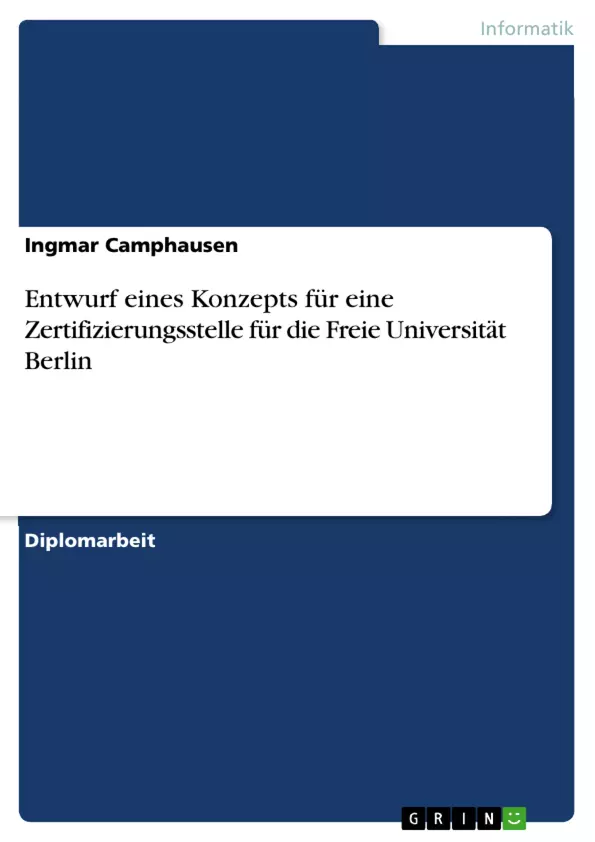Public key cryptography and the key certification needed to apply it will be a building block of confidential and authentic communication on the Internet and hence of its wide-spread use in research, commerce and everyday communication. To enable and promote the use of public key cryptography, especially among the members of the Freie Universität Berlin (FU Berlin), a concept is presented for the installation and subsequent operating of a public key certification authority (CA) for the FU.
The concept proposes the certification according to two slightly different sets of certification guidelines (policies) derived from the respective policies of the DFN PCA project, one with basic security requirements, the so-called "low-level policy", and one policy with enhanced security requirements, resulting in a "medium level" of security. The low-level certification may be performed mobile "on location" on the occasion of, e.g. events like the University’s summer fest, whereas the mediumlevel certification is allowed to take place only in-house in the rooms of the computer centre of the FU Berlin (ZEDAT) that will host the FU CA. This two-way strategy shall enable the CA to better promote itself and its services among the members of the university, as this is deemed essential for building a reputation, gaining the users’ trust and raising their awareness for the (in)security aspects involved with Internet communication.
For the certification process itself, a laptop computer running Linux as operating system is suggested due to the openness and more effective security features of this OS in comparison to the Windows variants available. To facilitate the build-up and initial operating of the FU CA, detailed to-do lists and step-by-step directions are given for some of the routine procedures in a CA.
In addition, the legal aspects of running a CA in Germany are briefly sketched, thereby concluding that it would not be possible to run the FU Berlin CA as a CA as described in the German Digital Signature Law (Signaturgesetz) due to the law’s high demands on physical, staff and organizational security measures which exceed the means the university could dedicate to this project.
Inhaltsverzeichnis
- Abstract
- 1. Einführung
- 2. Motivation
- 3. Konzept für eine Zertifizierungsstelle für die FU Berlin
- 3.1. Zertifizierungsrichtlinien
- 3.2. Zertifizierungsprozesse
- 3.3. Technische Ausstattung
- 3.4. Organisation und Personal
- 3.5. Betrieb und Wartung
- 3.6. Öffentlichkeitsarbeit
- 3.7. Finanzierung
- 4. Rechtliche Rahmenbedingungen
- 5. Schlussfolgerung
- Anhang
Zielsetzung und Themenschwerpunkte
Die vorliegende Diplomarbeit befasst sich mit der Entwicklung eines Konzepts für eine Zertifizierungsstelle für die Freie Universität Berlin. Das Ziel ist es, die Nutzung von Public-Key-Kryptographie innerhalb der Universität zu fördern und zu vereinfachen. Dies soll durch die Einrichtung einer eigenen Zertifizierungsstelle (CA) erreicht werden, die den Mitgliedern der FU Berlin die Möglichkeit bietet, ihre digitalen Signaturen zu erstellen und zu verwalten. Die Arbeit fokussiert dabei auf die konkrete Umsetzung des CA-Konzepts im Kontext der FU Berlin, inklusive der technischen, organisatorischen und rechtlichen Aspekte.
- Entwicklung eines Konzepts für eine Zertifizierungsstelle
- Definition von Zertifizierungsrichtlinien
- Analyse der technischen Voraussetzungen und Auswahl geeigneter Software
- Bewertung der rechtlichen Rahmenbedingungen in Deutschland
- Strategien zur Öffentlichkeitsarbeit und Benutzerakzeptanz
Zusammenfassung der Kapitel
Kapitel 1 bietet eine Einführung in die Thematik der Public-Key-Kryptographie und die Bedeutung von Zertifizierungsstellen für die sichere Kommunikation. Kapitel 2 beleuchtet die Motivation für die Einrichtung einer CA an der FU Berlin. Kapitel 3 präsentiert das detaillierte Konzept für die Zertifizierungsstelle, inklusive der Zertifizierungsrichtlinien, -prozesse, -ausstattung, -organisation und -betrieb. Kapitel 4 beleuchtet die relevanten rechtlichen Rahmenbedingungen in Deutschland.
Schlüsselwörter
Public-Key-Kryptographie, Zertifizierungsstelle, Freie Universität Berlin, Zertifizierungsrichtlinien, Digitale Signaturen, Rechtliche Rahmenbedingungen, Öffentlichkeitsarbeit
Häufig gestellte Fragen
Warum benötigt die FU Berlin eine eigene Zertifizierungsstelle (CA)?
Eine eigene CA soll die Nutzung von Public-Key-Kryptographie fördern, um vertrauliche und authentische Kommunikation in Forschung und Verwaltung zu ermöglichen.
Was ist Public-Key-Kryptographie?
Es ist ein Verfahren, das digitale Signaturen und Verschlüsselung ermöglicht, um die Sicherheit der Internetkommunikation zu erhöhen.
Welche Sicherheitsstufen sieht das Konzept vor?
Das Konzept schlägt zwei Stufen vor: Eine „Low-Level-Policy“ für Basissicherheit (z.B. für Events) und eine „Medium-Level-Policy“ mit höheren Anforderungen für den internen Betrieb.
Warum wird Linux als Betriebssystem für die CA empfohlen?
Linux wird aufgrund seiner Offenheit und effektiveren Sicherheitsfeatures im Vergleich zu gängigen Windows-Varianten für den Zertifizierungsprozess vorgeschlagen.
Entspricht die geplante CA dem deutschen Signaturgesetz?
Nein, die Arbeit stellt fest, dass ein Betrieb nach dem strengen Signaturgesetz aufgrund der hohen personellen und organisatorischen Anforderungen für die Universität nicht realisierbar wäre.
- Arbeit zitieren
- Ingmar Camphausen (Autor:in), 1999, Entwurf eines Konzepts für eine Zertifizierungsstelle für die Freie Universität Berlin, München, GRIN Verlag, https://www.grin.com/document/58



